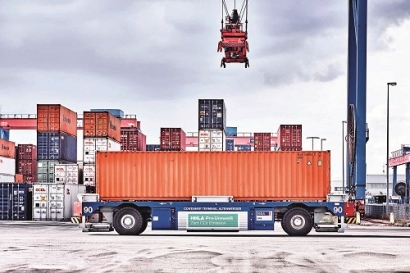
One of the greatest challenges of the energy transition in Germany is the safeguarding of grid stability. Currently, the share of renewable energy sources in the German electricity mix is over 40 percent . This development requires technical solutions by network providers ensuring companies and private consumers may be supplied with electricity at all times.
As opposed to power stations driven by fossil fuels, which can provide electricity on demand, this is not guaranteed with renewable energies. Weather-dependent energy sources like wind and sun are not always available. This leads to fluctuations that must be absorbed in order to guarantee a consistently secure supply and a stable frequency of 50 hertz (Hz) on the power grid.
Now, for the first time, HHLA and Next Kraftwerke, one of the largest virtual power plant operators in Europe, are investigating the extent to which industrially used mobile battery capacities can be connected to the grid so that primary control reserves may be utilized to provide stability.
By 2022, the approximately 100 AGVs used for container transport at terminal Altenwerder will be completely converted to fast-charging lithium-ion batteries, potentially providing 4 MW for the energy market at the 18 electric charging stations.
“This is, of course, not their primary purpose – container transport is. But in less busy times, free AGVs could provide battery capacity as mobile power stores to safeguard grid stability,” says Boris Wulff of the CTA Terminal Development department, who is responsible for the FRESH project at HHLA.
Together with Next Kraftwerke, the OFFIS Institute for Information Technology in Oldenburg and the University of Göttingen, HHLA is developing a process and software solution for accessing the power market. It will digitally control the demands of the virtual power plant operator and smooth terminal operations.
“Capacity utilization at the terminal determines whether AGV capacities are free. These in turn depend on such factors as ship schedules, weather and tide conditions, traffic volume and loading cycles of the AGVs,” explained Wulff. All these parameters must be included in order to develop reliable, efficient and, especially, automated processes.”
Alexander Krautz, Team Manager of Innovation & Development at Next Kraftwerke, added, “The digitization and electrification of the logistics branch – with its high energy consumption and special requirements – represents a challenge for our power system, while at the same time offering new possibilities for optimization and stabilization. Together with our FRESH project partners, this is precisely what we want to demonstrate.”
FRESH is funded by the German Federal Ministry for Economic Affairs and Energy as part of the “IKT for Electromobility III” technology program and receives subsidies of approximately €1.4 million.

